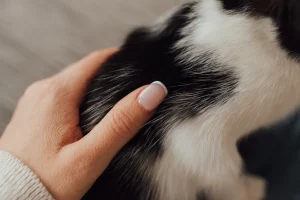Have you noticed that your cat’s tongue is white and are wondering why? In this blog post, we will explore the possible reasons behind this unusual phenomenon.
Sometimes, a cat’s tongue may appear white, which can be concerning for pet owners. This could be due to a variety of factors, such as dehydration, oral health issues, or even a reaction to certain medications. Let’s take a closer look at why your cat may have a white tongue.
Dehydration: A Common Culprit
If you’ve noticed your cat sporting a white tongue, dehydration could be the sneaky culprit. Just like us humans, cats need to stay well-hydrated to maintain their overall health. When a cat doesn’t drink enough water, their tongue can appear white due to lack of moisture in their mouth. This can be a sign that your furry friend needs a little extra TLC in the hydration department.
Keeping a cat hydrated is crucial, so make sure to provide fresh water in a clean bowl daily. You can also incorporate wet food into their diet to up their water intake. Just like us, cats need that H2O to keep them feeling their best.
Oral Health Problems
When it comes to a white tongue in cats, oral health problems could be to blame. Issues such as infections or gum disease can cause discoloration in a cat‘s tongue, signaling that a trip to the vet may be in order. Regular dental care is essential for cats to prevent these types of problems from occurring.
To keep your cat‘s mouth in tip-top shape, consider brushing their teeth regularly with a pet-safe toothbrush and toothpaste. You can also provide dental treats and toys to help keep their teeth and gums healthy. By staying on top of your cat‘s oral hygiene, you can help prevent those pesky dental issues that can lead to a white tongue. Remember, a healthy mouth equals a happy cat!
Did you know that certain cat breeds are more prone to oral health problems? Breeds such as Persians and Siamese are known to have a higher risk, so it’s essential to pay extra attention to their dental care.
Medication Side Effects
Certain medications can sometimes cause a cat’s tongue to turn white. If you notice this change in your furry friend, it’s essential to consult your veterinarian. They can review your cat’s medication regimen to determine if any of the medications could be causing the issue. Your vet may suggest adjusting the dosage, switching to a different medication, or exploring alternative treatment options. Remember, always follow your vet’s guidance when it comes to your cat’s health.
Nutritional Deficiencies
A lack of essential vitamins and minerals in your cat’s diet can potentially lead to a white tongue. To ensure your cat is getting the necessary nutrients, provide them with a balanced and high-quality diet. Look for cat foods that are specifically formulated to meet their nutritional needs. Additionally, consider incorporating supplements recommended by your vet to address any deficiencies. Remember, a well-rounded diet is key to keeping your cat healthy and happy.
Additional Unique Insight:
Aside from addressing nutritional deficiencies, it’s essential to monitor your cat’s water intake. Dehydration can also contribute to a white tongue in cats. Ensure your cat always has access to fresh, clean water to stay hydrated and maintain optimal health. If you suspect dehydration is a concern, consult your vet for further guidance.
Fungal Infections
If you notice your cat has a white tongue, it could be a sign of a fungal infection in their mouth. This condition, known as oral thrush, can cause a white coating on the tongue and other parts of the mouth. It’s important to have your veterinarian examine your cat to determine the cause and provide appropriate treatment. They may recommend antifungal medications or other treatments to help clear up the infection and restore your cat’s oral health.
Additional Insight: Fungal infections can be more common in cats with weakened immune systems, so it’s essential to address any underlying health issues that may be contributing to the infection.
Other Possible Causes
While fungal infections are a common reason for a white tongue in cats, there are other potential causes to consider. Respiratory issues, such as asthma or chronic bronchitis, can sometimes lead to a white tongue due to breathing difficulties. Certain diseases, such as feline leukemia or kidney disease, may also manifest as oral symptoms, including a white tongue. If you notice other concerning symptoms along with the white tongue, such as changes in appetite or behavior, it’s crucial to seek veterinary advice promptly.
Remember, your cat’s oral health is an essential part of their overall well-being. Regular dental care, including brushing your cat’s teeth and providing dental treats or toys, can help prevent oral health issues and keep their tongue looking healthy. And always consult with your veterinarian if you have any concerns about your cat’s oral health or any changes you observe in their tongue color or texture. Your furry friend will thank you for looking out for their health!
Prevention and Treatment
If you notice your cat’s tongue turning white, it could be a sign of dehydration or an underlying health issue. One way to prevent this is by ensuring your kitty has constant access to fresh water. Additionally, a balanced diet can help maintain your cat’s overall health, including their tongue color. If the issue persists, it’s essential to consult your veterinarian to identify and treat any potential health concerns.
When it comes to treatment, your veterinarian may recommend various options depending on the underlying cause. This could include hydration therapy, dietary changes, or medication. Early intervention is crucial in ensuring the best outcome for your furry friend, so don’t hesitate to seek professional help if you notice any concerning changes in your cat’s tongue.
When to Consult a Veterinarian
If you observe any changes in your cat’s tongue color, such as it turning white, it’s vital to consult a veterinarian promptly. Changes in tongue color could indicate various health issues, ranging from dehydration to more severe conditions. Your veterinarian will be able to conduct a thorough examination and provide appropriate treatment options to address the root cause of the problem. Remember, early intervention is key to your cat’s health and well-being.
Curiosity Corner: Did you know that a cat’s tongue is covered in tiny, hook-like structures called papillae? These papillae help cats groom themselves effectively by acting like a comb to remove dirt and loose fur from their coats. Additionally, a cat’s tongue is rough due to the presence of these papillae, making it perfect for grooming and scraping meat from bones. Next time you see your cat grooming, take a closer look at their fascinating tongue!
Alex, a passionate animal lover, has experience in training and understanding animal behavior. As a proud pet parent to two dogs and three cats, he founded AnimalReport.net to share insights from animal experts and expand his knowledge of the animal kingdom.




